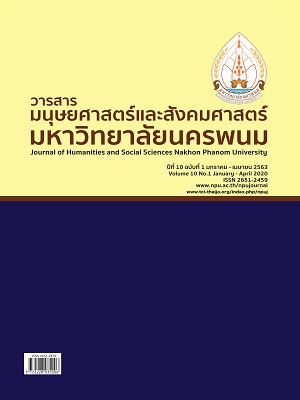The Effects of Inductive Learning Activity on Mathematical Concepts and Mathematical Reasoning Ability of Relation on Pythagoras Theorem of Mathayomsuksa 2 Students
Main Article Content
Abstract
The purposes of this research were 1) to develop the inductive lesson plan to be effective according to criteria 75/75, 2) to study the effectiveness index of learning activity, 3) to compare the mathematical concepts after studying with the inductive learning activities with 70 percent criteria, 4) to compare the mathematics reasoning ability after studying with the inductive learning activities with 70 percent criteria. The sample group of this study was 40 students of Mathayomsuksa 2, Burirampitthayakom School, Buriram province. The instruments for collecting data were 1) the inductive learning activities lesson plans, 2) the learning achievement test which the reliability at 0.928, 3) the mathematical concept test which 0.832, 4) the mathematical reasoning ability which 0.844. The statistics for this research were percentage, mean, standard deviation and tested the hypothesis by using t - test for one sample. The research results were found that 1) the inductive lesson plan efficiency was 80.41/77.63 2) the effectiveness index of learning activity was 0.6175, 3) the mathematical concepts after studying with the inductive learning activities was higher than 70 percent criteria with statistical significance at .05 level, 4) the mathematical reasoning ability after studying which the inductive learning activities was higher than 70 percent criteria with statistical significance at .05 level.
Article Details
References
สหกรณ์การเกษตรแห่งประเทศไทย.
จิราพร มาพริก. (2558). การพัฒนาชุดกิจกรรมการเรียนรู้แบบอุปนัย เรื่อง ฟังก์ชันลอกาลิทึม สำหรับนักเรียนชั้น
มัธยมศึกษาปีที่ 5. วิทยานิพนธ์ ปริญญาวิทยาศาสตรมหาบัณฑิต. พิษณุโลก : มหาวิทยาลัยนเรศวร.
เฉลิมวุฒิ คำเมือง, ไพรัชช์ จันทร์งาม. (2560, กรกฎาคม). การศึกษาและสร้างนวัตกรรมที่แก้ไขมโนทัศน์ที่คาดเคลื่อนทาง
คณิตศาสตร์ในสาระจำนวนและการดำเนินการของนักศึกษาครูคณิตศาสตร์ภาคตะวันออกเฉียงเหนือตอนล่าง,
การประชุมวิชาการและนำเสนอผลงานวิจัยระดับชาติ ครั้งที่ 7 ; 377-387.
ชูศรีวงศ์รัตนะ. (2550). เทคนิคการใช้สถิติเพื่อการวิจัย. นนทบุรี : ไทยเนรมิตกิจอินเตอร์โปรเกรสซิฟ.
ณัฏฐปิญชาน์ พิชญาชมชื่น. (2558). ผลการจัดกิจกรรมการเรียนรู้แบบอุปนัยที่มีต่อมโนทัศน์ทางคณิตศาสตร์และความ
สามารถในการให้เหตุผลทางคณิตศาสตร์ ของนักเรียนชั้นมัธยมศึกษาปีที่ 4. วิทยานิพนธ์ปริญญาการศึกษา
มหาบัณฑิต. ชลบุรี : มหาวิทยาลัยบูรพา.
ปพนวัจน์ ลภัสภิญโญโชค. (2559, พฤศจิกายน-มีนาคม). “การพัฒนามโนทัศน์ทักษะและกระบวนการทางคณิตศาสตร์
ระดับประถมศึกษา”, วารสารศึกษาศาสตร์ มหาวิทยาลัยศิลปากร. ปีที่13(ฉบับที่ 2) ; 45-55.
สำนักงานเขตพื้นที่การศึกษามัธยมศึกษาเขต 32. (2561). ผลทดสอบทางการศึกษาระดับชาติขั้นพื้นฐาน O-NET.
ชั้นมัธยมศึกษาปีที่ 3 โรงเรียนบุรีรัมย์พิทยาคม ปี 2557-ปี 2559. [ออนไลน์]. ได้จาก https://sites.google.com/a/ssbr.go.th/ssbr_32/ [สืบค้นเมื่อวันที่ 14 มีนาคม 2561].
Artzt, A. F., & Shirel, Y. F. (1999). Mathematics reasoning during small-group problem solving.
Ausubel, D.P. (1968). Educational psychology : A cognitive view. New York : Holt, Rinehart
And Winston.
Eggen, P.D., Kauchak, D.P., & Harder, R.J. (1979). Strategies for teacher information
Processing models in the classroom. New Jersey : Englewood Cliffs Prentice-Hill.


